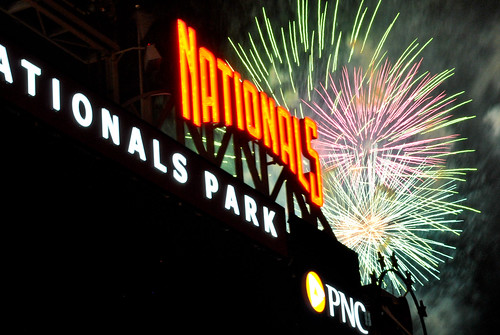
‘Friday Night Fireworks’
courtesy of ‘MudflapDC’
The baseball season is over and done with. Hockey starts Friday, and Basketball in a few weeks. The beginnings of winter are incumbent upon us to respect, and the end of the baseball season is a part of that winterizing process. This was a season of growth for the Nationals in many ways, and there’s a lot to respect in terms of significant process. There’s also a lot that we’ll have to see changed in order for this to become a contending franchise in the next decade.
This is a turning point for the Nationals, and there’s a real opportunity for this club to take what it’s spent the last five years working on and put it to good use. The Nationals are not a complete franchise, right now, but in two or three years, they could be a .500+ club with a shot at the Wild Card. Will they get there? I hope so, but I fear for the worst. Losing the head of their front office will be a big test for this club that has relied upon his experience so extensively. There is, as in many cases, both crisis and opportunity in this change. The Nats finally have a solid GM in place, someone who can handle baseball operations and contract negotiations without giving away the farm, in Mike Rizzo, and the addition of Andrew Feffer as the Nats’ Chief Operating Office this past off-season gives them someone who understands the intricacies of running the ballpark operations side of things for the Nationals.
Stan Kasten is right: DC could be a baseball town. There’s an audience, yes, but they’re going to have to be shown that the product’s worth watching. This season? It was too volatile to promise to a good audience. If the Nats want to draw 2-2.5M fans each year, they’re going to have to put out there something that people want to watch. And generally speaking, those people shouldn’t just be in from out of town. Let’s take a look at the lineup this season and see how everyone did, shall we?
courtesy of ‘philliefan99’
1B: Adam Dunn – B
Adam Dunn hits home runs like clockwork every season. Each season since 2004, Dunn has blasted 35 or more homers, and 2010 was no exception. Dunn’s 103 RBI were the tops of the offensive stats for the Nationals this season, but Dunn’s about the anti-thesis of clutch for the Nationals this season, hitting .169 with RISP and two outs, and .217 just with RISP. Another black spot on the record: 199 strikeouts this season. While I expect sluggers will strike out, one could hope that they wouldn’t do so at near-record pace.
The biggest question facing Dunn & The Nationals this off-season is where he’ll sign and for how much. The “Sign Adam Dunn” chants sung in harmony from the upper-desk by fans speak to the power of a singular player as a strong-hold on the Washington baseball fan’s heart strings. But, I think that if it was possible for the Nats to make that deal at this point, they would have made it, and that Dunn is a goner. The Nationals are committing to spending a good amount in the off-season, and the options are fair. Sadly, I think Dunn’s time in DC is completed, and while we appreciate his talents at the plate, his likely demands for $50M over 4 years will be too much to give up from a strategic standpoint. Sorry Adam, it was a pleasure to watch you play, and you’ll always be welcomed here by the fans.
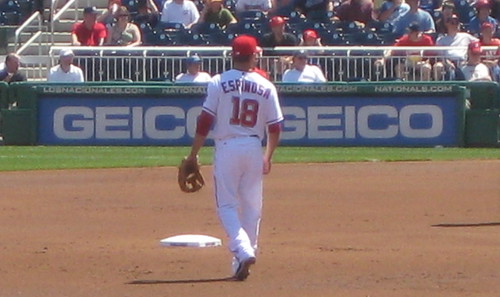
‘Espinosa!’
courtesy of ‘Make Lemons’
2B: Adam Kennedy – C+
Cristian Guzman – Incomplete
Danny Espinosa – A+
This was a weakspot for the Nationals right up until the first of September. Adam Kennedy’s weak plate numbers, and Cristian Guzman’s departure left the Nats with a serious hole in the middle of the infield. Danny Espinosa’s arrival in Washington in September and subsequent performance has it looking like the Nationals have found the solution to their problem in the middle of the infield. His speed around the bags even got some of the other guys hustling a little bit more down the first base line. He served as a jolt of energy for a club who lost a bit of passion toward the end of another losing season. A scrappy and agile defender, and a plate presence that cannot be ignored. Welcome to the club, kid, we’re glad you’re here, you’re just in time.
I’m not afraid to say this: Give that kid 500 plate appearances at 2B next season and he’ll be Gold Glove #2 in the Nationals’ infield. I love watching him play, and he’s proven that he’s also got the power and the eye to hit at the major league level. A whole season of Espi? Sign me right up.
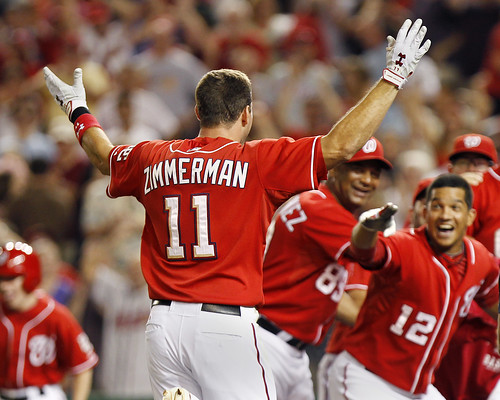
‘Zimmerman Wins It’
courtesy of ‘Max Cook’
3B Ryan Zimmerman – A
Zimmerman continues to be the beating heart of this franchise. Gold Glove defense, matched with clutch hitting, Mr. Walkoff remains the center of the Nationals clubhouse. His performance this season continues a superstar trend that cemented him among the best in the game today. Look for another Gold Glove for Zimmerman this winter. Zim saw his first troubles with injuries this season, with a hamstring problem early in the year, and an intercostal muscle strain to end the year, we’ll be watching him closely this off-season and in the Spring to make sure that the core of this team is in good shape for another season at the hot corner.
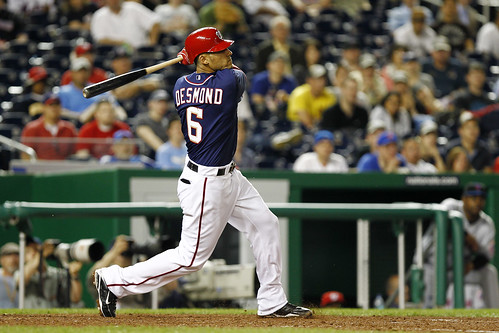
‘Nationals vs Mets 12’
courtesy of ‘maxedaperture’
SS Ian Desmond – B
It’s tough to be fast and agile, but young. Ian Desmond showed his finest aspects this season, but he also showed his inexperience. His 34 Errors at Shortstop were devastating to the franchise, and I’m hopeful that the sophomore album will be better than his breakout hit this season. Desmond’s got a lot to offer at shortstop, with incredible defensive range, and a solid #6 bat that can hit at the top of the lineup in a pinch, but he’ll absolutely, positively need to spend some of his off-season working on practicing the mental mechanics of shortstop.
A struggle besides his obvious difficulties in the defense department was finding a groove in the line up. Riggleman bounced him around more than any other player on the team. One week he’s batting second, the other sixth, then fifth with a little time spent in the eight hole. Once he settles in and finds that groove though, he’s got a nice bounce off the bat that if maintained and improved upon could be the birth of a lengthy career.
Too many times this season, Desi got ahead of himself mentally, and that caused a good number of his ridiculously high errors total. Get this under control, and the Nats could be looking at one of the best defensive infields in the bigs. There’s another option here, too, but I’d prefer not address it. Slow down, just ever so slightly, Ian, and think through where that throw is going. I’d rather have the runner be safe at first, than granted second on a throwing error.

‘Nyjer Morgan diving to first’
courtesy of ‘MudflapDC’
The Outfield Overall – B-
How do you grade a platoon? Carefully, it seems. Nyjer Morgan was the longest tenured outfielder of the crowd, playing 134 games in Center. Josh Willingham was the primary actor in left, as you’d expect, but his injuries left him out for 50+ games. Right field was a bit a problem spot for the Nats, and they did their best to address the gap with a platoon of Mike Morse, Roger Bernadina, Willie Harris and Justin Maxwell.
There’s a lot to like in this group, but there’s also a lot to work on. Mike Morse was a great surprise, providing solid defense, and some clutch hitting, but his longer stint in right field in the third quarter of the season was timed right with a slump at the plate. Justin Maxwell, sad to say, was only useful to the Nationals with the bases loaded. His outfield chops during his few stints with the big club weren’t up to par to match his otherwise substandard bat.
Nyjer Morgan’s speed and enthusiasm, even if sometimes badly placed, were counteracted by his disciplinary issues with the league and some very very suspect behavior on the basepaths. Nyjer can either decide to be a distraction, or he can put himself deep in this game. His baserunning has to improve if he wants to stay in that leadoff slot. That’s not a place where you put a guy that gets picked off more than he steals 2nd. His occasional defensive web gems are no match for his ego. It’s not anyone’s place to pass judgment on a ball player’s personality when all anyone needs to care about is what they do on the field, but when a player’s personality gets in the way of their productivity that’s a sign of trouble
Josh Willingham’s season-ending knee surgery this summer was just about as brutal as they come. You never like to see a guy having a season like Willingham’s disappear to injury. Willingham will be back next season, and have everything to prove as he finishes out the final year of his contract. The Hammer’s good defense and better plate presence will prove valuable to a cohesive squad.
There were some very pleasant surprises for the Nats in Roger Bernadina’s play, from a strong arm and rangy defense, to a plate presence that can drive in some runs. Would I prefer someone who could slug it a bit harder? Absolutely, but a .691 OPS figure from a platoon player is about as good as you’re going to see. While the Nats could use an every-day right fielder (paging Carl Crawford, Mr. Crawford, please pick up a white courtesy phone.), they could do a lot worse than the Pride of Curaçao in the meantime.
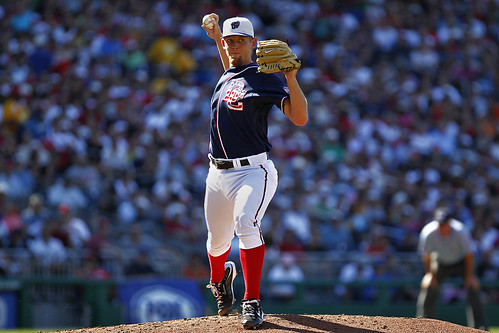
‘Strasburg Throws to First’
courtesy of ‘Max Cook’
Starting Pitchers – Overall – C+
Well. That happened.
Before we get to what worked, let’s talk about what didn’t work at all.
I had high hopes for Jason Marquis this Spring, but what an awful year this guy had. For $7.5M in salary, the Nats got 13 starts from Marquis, and just two wins. An ERA of 6.60. A staff-worst 11.7 H/9. Absolutely unacceptable.
The other big disappointment on the mound was Scott Olsen, who finished the season unhappy in the bullpen. 4-8 with a 5.56 ERA. A little less expensive than Marquis at $1M, plus some performance bonuses. Still, not a good season for Olsen. What will the Nats do come springtime? Your guess is as good as mine.
JD Martin/Luis Atilano/Craig Stammen were three of the younger faces in the 9-slot for the Nats this season. Atilano proved to be more lucky than good, but had some good outings that with further refinement might make him a #5 starter. JD Martin has been a rougher story, with his low velocity and dependency on a shaky changeup not doing him any favors. I wanted nothing more than to see Craig Stammen succeed in the starting rotation, but he’s become a much better long reliever than I ever could’ve hoped. Stammen proved to have a great deal of poise coming out from the bullpen.
But enough with what didn’t quite work, let’s talk about the good stuff.
John Lannan. Yes, he went down the minors in the middle of the season, but the salvage of his season to finish 8-8 was nothing short of extraordinary. The Lannan we saw from August onward was the Lannan that we’ve been raving about for a few years. His sinker was sinking, and he was going deeper and deeper into the ballgame. Lannan’s peak came in late August when he went 7 2/3 against St Louis giving up just one run and scattering 8 hits against a strong Cardinals lineup.
Stephen Strasburg. Yes, the UCL tear was deeply frustrating, but while he was up, he was about the most dominating force in Major League Baseball for 12 starts. 91 strikeouts, just 17 walks, and an ERA of 2.91. That’s not the sort of outing you expect from a rookie, even one as hyped as Strasburg was. We expect that his convalescence will be the same sort of extraordinary that Stephen is, and hope that he’s back by the end of next season.
Livan Hernandez. The old man of the staff ate up 211 IP in 2010, and racked up a record of 10-12. His 114 strikeouts were the most of any pitcher for the Nats, and his 3.66 ERA was the best of the starters who spent the whole year with the club. This was a banner year for Livo, and I was very pleased to see that the Nationals locked him up fro another season in 2011. Give him a bit more run support and this is a guy who can win 14-15 games in a season and eat up a lot of innings for the Nationals.
Jordan Zimmermann. You can’t really give Jordan Z a grade on his 2010 performance, except for to remark that he came back from the same surgery Strasburg just had in just 11 months. While his starts were a mixed bag, to come back into the starting rotation and pick up a couple good starts and a win in his seven big league starts, there’s a place to build from. Since his arrival in DC, the Nationals have yet to see a consistent season from him, and there’s hope now that 2011 will be his coming out party. Let’s just also hope that his control is there in the Spring, and his velocity remains strong.
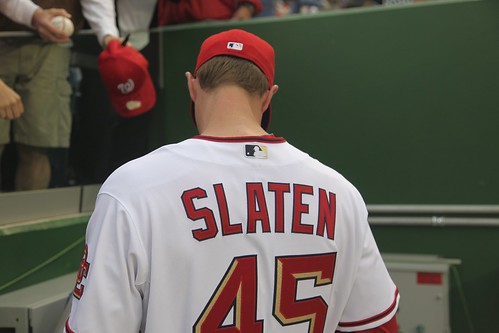
‘Doug Slaten’
courtesy of ‘tbridge’
Bullpen – Overall – A+
If I can check the box that reads “Exceeds Expectations,” the bullpen is the place to do it. The Nationals 10-game improvement over the last year can largely be attributed to the work of the bullpen and its success. The Nats’ relievers totaled an ERA of just 3.33, which is seventh all-time among ‘pens that have pitched as much as the Nationals’ did this season. Doug Slaten, Drew Storen, Tyler Clippard, Matt Capps, Miguel Batista, Joel Peralta, Sean Burnett and Tyler Clippard made serious strides to keep the Nationals where they were.
In previous seasons, the bullpen were the Gas Can Boys, always ready to throw fuel on the fire and it cost the Nationals game after game. That wasn’t so this year. This wasn’t a group to crack under pressure, for the most part, this was a group of pitchers who, when handed the game, often in dicey situations, gave up just over one run in the final third of the game. That’s all you can ask of your pen.
Drew Storen and Sean Burnett were pretty much lights out for the Nationals this season. Burnett kept the opposition, in 73 appearances, to just .220 BA and .297 SLG. Storen kept opponents to .241 and .332. Both of these
Utility/The Bench – Overall – C-
The good news here is that their seasons are over. The Nats’ bench has not been one of their strong suits this season. Pinch hitters were batting just .202, and slugging just .289. Compare that to the bench of the Braves, who batted .250 and slugged just under .500, and you’ve got a major weak spot in the organization. The Nationals have a bunch of guys on their bench who are situationally useful, it’s just that those situations didn’t present themselves this year. Definitely qualifies for “needs improvement”
Manager – Jim Riggleman – B
It seems that, in the eyes of Manager Jim Riggleman, every one of the Nationals’ 90+ losses, they were facing an ace. Or, at least, that’s what he’d tell the press after the game. Insofar as the Nationals often struggled at the plate, they could turn even the lowliest journeyman starter into an ace. Riggleman’s constant postgame credit to the opposing team wore on me as the season went on. I know it’s not necessarily good form to bash your guys just seconds after the end of a game, and it got him in trouble when he did talk out of turn about Nyjer Morgan, but would it kill you, Jim, to show some frustration in the continued failures this season?
Yes, there’s another team out there, and yes, there’s going to be some times when you face an ace and have your hat handed to you, but that’s not every single loss. It would be great to see some additional emotion out of you, Jim, as you’ve got an immense amount of heart. You’re a big improvement over the previous occupant of your office, and some things are going right as planned. Just ease off that ace stuff, will you? And the pitching changes are starting to wear on me as they did with Frank Robinson.
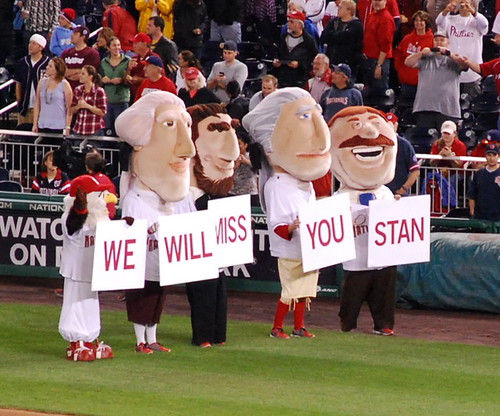
‘We Will Miss You Stan’
courtesy of ‘afagen’
Front Office – B
It’s hard to give a good grade to a team that hasn’t finished over .500 in its first five years. The Nationals have had a rough introduction to their city, and the constantly changing roster of players has made it hard for the city to love the franchise when they can barely keep track of the players. I can see that starting to turn around, but the Front Office is going to have to do a lot more to cement in the heart of Washingtonians a love for the game of baseball.
Stan Kasten’s leadership in the Front Office will be sorely missed as he transitions away from the club. I don’t think he’ll stray too far from DC, though, as he’s still a part of the ownership group here. Look for Stan to assume a more interesting position in baseball in the next couple of years.
Team MVP (Offense) – Adam Dunn
With the exception of his lackluster clutch numbers, Adam Dunn had the best season at the plate for the Nationals. 38 homers, 103 RBI, all head and shoulders above the rest of the club. The Nats will need to work hard to find someone that can fill his shoes at first.
Team MVP (Defense) – Ryan Zimmerman
Next year, this award will be a toss-up, judging on Danny Espinosa’s time at 2B this fall, but until such time, Zim remains the uncountered king of defense in Washington.
Team MVP (Pitching) – Stephen Strasburg
With a brutal fastball and moving pitches that have to be witnessed to be believed, Strasburg came to DC and shook the place up. Not since Opening Night in 2008 when Ryan Zimmerman won it in the bottom of the 9th have a seen a crowd so in love with the game as when Strasburg debuted in DC. That was as electric an audience as ever I have witnessed. No one had as good an arm as Strasburg did this year. I look forward to his return next Fall.
Overall Grade: C+
It is difficult to watch a team with such potential in the longterm play so roughly in the present. Like many baseball fans, I am an optimist; I see in the springtime a world of opportunity, and by July 1st, I am reconciled to toleration. The Nationals were a team in 2010 that displayed flashes of good baseball, in the midst of some absolutely execrable play. It was maddening at times to watch this franchise, with so many good pieces, play like a team without any cohesion.
With ticket prices dropping, and numerous deals for potential season ticket holders, there’s some potential for next season, but with Stephen Strasburg still recovering, and Bryce Harper at least two years away, the best hope for NatsTown is still ahead in the distance, but with the Lerners promising to spend, the present can be very comfortable, indeed.
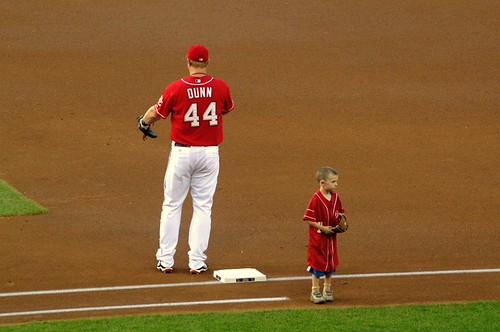



I think you were too generous in your grades to everybody not named Ryan Zimmerman. I’m all about Espinosa, but the prolonged slump knocks him down to a B+, tops, in my mind.
Kasten should be a bigger loss than I think he is, because on matters of payroll, they were not listening to him. I think he ran out of things to do once Rizzo got settled in. I don’t think he could give us his best and with the Phillies fan invitations we saw his worse.
It wasn’t a boring season though, probably the most exciting since 2005.
I wouldn’t call 9 games “prolonged,” but even with that short slump, his numbers are pretty tremendous.
The Nats were not the sum of their parts this season, Mark Zuckerman absolutely got it right. The pieces were, in many cases, good, but the whole effect was lacking.
So a last place team who finished 24 games under .500 and 28 games out of first place gets a passing grade, huh? I hate to see what you consider failing.
In my mind, .500 is a ‘C’
Anthony,
All report cards are based on expectations for the student, much as they might be in real schools. It’s not all about standardized tests here ;)
As a teacher, I think that’s an unfair way to grade
Also, what were the expectations for the Nats. I thought they would be about .500. As such, they still were a failure.
As a writer, I could care less about your teaching.
The Nats are still 11 games better than last year, which is no small feat.
“As a writer, I could care less about your teaching.”
Way to drive one of the two people who bothered to comment away from your writing.
That did come out wrong, Anthony, I do apologize.
But really, I don’t think you get to decide how I grade things, especially things like subjective play issues. The Nats aren’t a great ballclub, but there are parts that are really working for them. The Nats had the fifth best bullpen in the league by ERA, and the second best by strikeouts. There’s still plenty to be optimistic about, even if they lost more than they won.